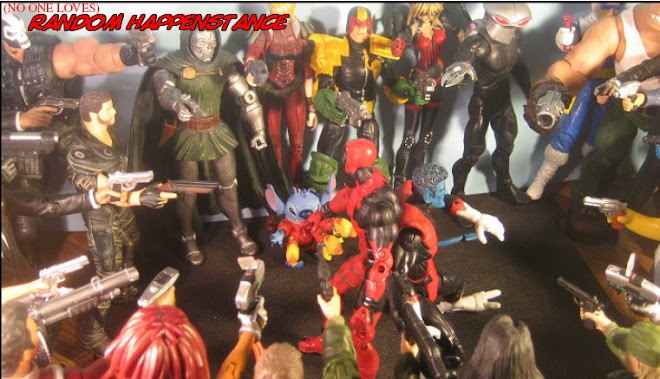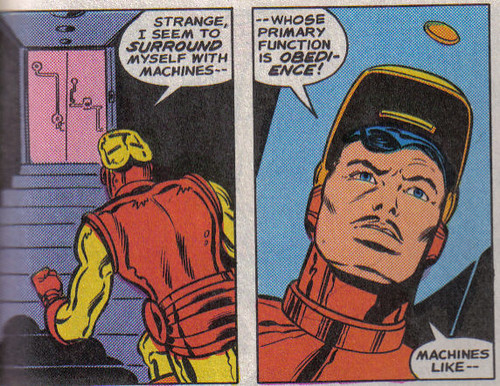
Atlas, Bishop, Black Widow, Blizzard, Doc Samson, Fixer, Invisible Woman, Joystick, Mach IV, Micromax, Mr. Fantastic, Ms. Marvel, Radioactive Man, Sabra, She-Hulk, Songbird, Spider-Man, the Thing, Tigra, Wasp, Yellowjacket, Wonder Man.
I feel like I'm being pretty hard on Civil War, considering I'm not devoting a lot of time or cash to reading it. And I don't think the issues involved are necessarily at fault: should super-heroes have the right to a secret identity and relative autonomy? Or should the government have the right to monitor, train, and license super-heroes? Good questions. I just don't think making this a 'Civil War' by arbitrarily assigning characters to a side for the purpose of generating conflict, makes for a good story.
Also, just from looking at the list up there on Iron Man's side (from the Daily Bugle Civil War special) it looks like three are going to be switching sides (or in the case of the Thing, leaving the whole mess). And Micromax, Sabra, and Radioactive Man are from England, Israel, and China, respectively: they would probably be deported if they were against registration, but they aren't citizens so it shouldn't be an issue.
Also, I don't see Black Widow as being pro-registration: are her most recent limited series out-of-continuity?
In a slightly different vein, I was thinking about House of M for a moment earlier today as well: I didn't read the regular series for that right away either,but I was thinking about the waste of the alternate-reality Hulk and Iron Man issues: were the readers clamoring for aboriginine Hulk or Ultimate Robot Fighting Iron Man? I like alternate reality stories, but they should be about how a changed circumstance can affect the choices a character makes: If Batman's parents had been attacked but not killed by a mugger, how would that affect young Bruce Wayne? Would he devote himself to fighting crime, and if so, at the same level that he did as in the Batman's reality? Or would he make a different choice?
Unfortunately, most What If? or Elseworlds or similar stories end up being about how cool it would be if Wolverine was blow'd up, or how Wonder Woman would look as a 17th century French Aristrocrat: a different coat of paint, when what I'm interested in is a change in architecture. If you put Hulk or Iron Man or any character in a radically altered world, show how it's changed the character, and it better be big. Too often, the answer is Hulk will be Hulk, or that Tony Stark is destined to become Iron Man; whether they were born in Atlantis or put into a world where America was never colonized. I'm probably reading too much nature vs. nurture into this, so I'll let it go.
Still, and I don't know if I made this point in Iron Man Week a while back; but I'm not too worried about Tony: his origin and characterization will probably change with the upcoming movie anyway. And if he can survive through the 'Teen Tony' issues, it shouldn't be a problem.


I know it's not, but it reminds me of Mike Allred.
ReplyDeleteJ.R. Jr. had those art chops from the beginning, huh? If only he could draw every Marvel comic...
I agree that the occasional non-continuity tale that explores how a person would _not_ become a particular superhero would be very fascinating.
ReplyDeleteBut for some reason, writers have accepted this idea that these characters are tied to their superheroic identities beyond any question of circumstance.
I am particularly fascinated with Peter Parker in this vein. Part of his character is that he's got this vast intellect that he never could bring to bear because of all his other problems. The idea that he could have been one of the Tony Stark or Hank Pym level scientists in the Marvel Universe is part of the character's tragedy.